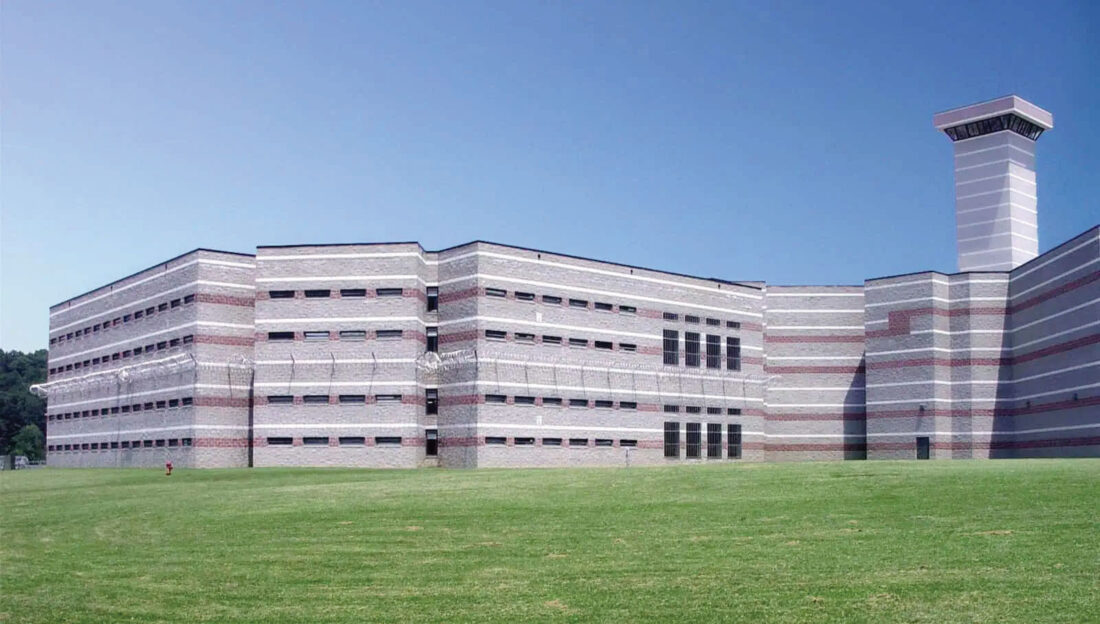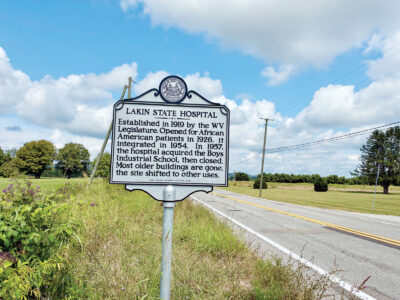State health facility official, prison superintendent held in civil contempt
Assistant attorney general recommended to lawyer disciplinary board

The Mount Olive Correctional Complex in Fayette County (Photo Courtesy/Silling Architects)
CHARLESTON — A cabinet secretary and a superintendent of one of the state’s prisons are being held in civil contempt court for defying a federal order to commit a suicide-prone inmate to one of West Virginia psychiatric hospitals, while a state assistant attorney general could face discipline for allegedly helping state officials ignore the order.
In a memorandum opinion and order issued Monday, U.S. District Judge Thomas E. Johnston found Jonathan Frame, the superintendent of Mount Olive Correctional Complex, and state Department of Health Facilities (WVDHF) Cabinet Secretary Michael Caruso, in civil contempt of court, for defying a court order to transfer Keith Lowe, an inmate at Mount Olive, to a state-owned psychiatric hospital.
Johnston also ordered that state Assistant Attorney General Gail Lipscomb be referred to the West Virginia Office of Disciplinary Counsel to determine of any action should be taken against Lipscomb for her role in assisting Caruso and Frame to avoid following the court order.
The order stems from a case originally filed in Kanawha County Circuit Court and transferred to the U.S. District Court for the Southern District of West Virginia. Lowe, the plaintiff, was seeking an injunction against Frame, the state Division of Corrections and Rehabilitation (WVDCR) and PsiMed Corrections LLC.
According to other court filings, Lowe had been held in solitary confinement at Mount Olive for more than 12 years, resulting in a suicide attempt on April 6. Lowe sought an injunction to order his transfer from Mount Olive to William R. Sharpe Hospital in Weston, a state-owned psychiatric hospital. On May 23, Johnston granted a motion for Lowe’s transfer to a state-owned psychiatric hospital. However, as of Aug. 25, Lowe’s transfer has not occurred.
“How did this happen? On May 27, 2025, Defendant Lowe claims he received the order granting the preliminary injunction,” Johnston wrote. “Despite its clarity, the order was apparently confusing to Defendants and other members of WVDCR. Defendant Frame and others within WVDCR attempted to seek clarity by asking each other what this Court’s order meant for them. At no point was this Court made aware of Defendants’ purported confusion.”
Instead of making the transfer, Johnston said that WVDCR only filed a petition on May 27 to have Lowe involuntarily committed. Lowe was transferred from solitary confinement on May 29 and moved to Mount Olive’s Mental Health Unit. On May 30, a probable cause hearing was held in Fayette County before Mental Hygiene Commissioner Evan Dove. Frame participated remotely and Lowe was represented by a public defender, while Lipscomb was physically at the hearing.
“Apparently, it was unclear to pretty much everyone what Attorney Lipscomb was doing at this hearing,” Johnston wrote. “Attorney Lipscomb claimed that she ‘appeared at the probable cause hearing’ on behalf of Sharpe Hospital and the West Virginia Department of Health Facilities.
“Defendant Frame largely corroborated that claim at the contempt hearing, stating that he knew Attorney Lipscomb was present but did not know if she was representing him,” Johnston continued. “However, Commissioner Dove believed Attorney Lipscomb was representing Defendant Frame. This confusion on his part was corroborated by the fact that Commissioner Dove repeatedly referred to Attorney Lipscomb as counsel for the applicant, Defendant Frame, during the probable cause hearing.”
Despite Lowe being willing to waive the hearing in order to be committed, Lipscomb insisted on the hearing continuing in order to challenge the involuntary commitment. A mental health professional testified that Lowe’s attempted suicide combined with his years in solitary confinement made him more likely to attempt suicide again. But under questioning, Lipscomb argued that Mount Olive was adequate for addressing Lowe’s mental health issues.
“Despite the fact that this Court found Mount Olive incapable of treating Plaintiff, Attorney Lipscomb invited Commissioner Dove to make a finding that Mount Olive was capable of providing treatment for Plaintiff,” Lipscomb wrote. “Accordingly, Attorney Lipscomb asked Commissioner Dove not to commit Plaintiff.”
Dove issued an order keeping Lowe from being transferred from Mount Olive, stating that Sharpe Hospital did not have adequate resources to meet the security needs for Lowe. But he also did give Frame and WVDCR two weeks to find a state facility to place Lowe unless services could be provided to Lowe virtually while at Mount Olive.
In a June 5 status conference before Johnston, Lipscomb denied that Frame and the Department of Health Facilities had opposed Lowe’s transfer to a state psychiatric facility. Instead, Lipscomb argued that state procedures prevented Lowe’s transfer and that Lowe needed to be evaluated at Sharpe Hospital before being admitted.
“(Lipscomb) left this Court with the impression that Plaintiff needed to be evaluated by Sharpe Hospital in order to be admitted, and that such evaluation could not occur because he was not admitted into Sharpe Hospital,” Johnston wrote. “Logically, this was somewhere between a conundrum and a studied impossibility.”
Despite a June 30 commitment hearing before Dove that determined that Lowe’s treatment at Mount Olive since April “had not solved his suicidal ideations,” Lowe had still not been transferred per the federal court order. Instead, the state decided to begin the process – approved around July 22 – of transferring Lowe to a mental health facility in Missouri by Sept. 10. However, Lowe attempted suicide again.
“The delay in transfer, however, came at a cost. On July 7, 2025, Plaintiff attempted suicide by cutting himself with a dull razor,” Johnston wrote. “According to Defendant Frame, Mount Olive failed to place a razor restriction on Plaintiff when he was moved from solitary confinement to the Mental Health Unit. Mystifying.
“Shockingly, Defendant Frame stated at the civil contempt hearing that Mount Olive staff neglected to place a razor restriction on Plaintiff when he was moved to the Mental Health Unit,” Johnston continued in a footnote. “That seems to fly in the face of the concerns for self-harm that prompted the move in the first place. This circumstance sinks Mount Olive’s argument that it can properly treat Plaintiff, not least because the record developed at the preliminary injunction hearing indicated that Plaintiff previously attempted suicide with a razor.”
On July 24, Lowe filed a motion asking the court to enforce the May 23 preliminary injunction, finding Frame and Caruso in civil contempt, and issuing other sanctions. Johnston agreed in his Monday order, determining that Caruso and Frame were bound by the preliminary injunction to transfer Lowe to a state psychiatric facility. Johnston also determined that Lipscomb actions were meant to provide cover for Frame.
“WVDHF acted to aid and abet Defendants’ violation of the preliminary injunction,” Johnston wrote. “Attorney Lipscomb indulged Defendant Frame in the charade that this Court’s order only required him to file a petition to commit Plaintiff, but somehow gave him license to actively oppose that commitment order from being issued.
“Attorney Lipscomb’s appearance at the probable cause hearing was a blatant attempt to give plausible deniability to Defendant Frame,” Johnston continued. “By making the arguments she made alongside Defendant Frame, both he and WVDHF attempted to portray his own violations of the preliminary injunction as the independent actions of WVDHF.”
Johnston said it was apparent that Dove was misled to believe that Lipscomb was the legal counsel for Frame and that were was ample opportunity for Frame and Lipscomb to advise the commissioner otherwise, calling their failure to do so a “calculated strategy on their part to deceive both Commissioner Dove and this Court.”
“(Frame) and the other Defendants, took a deliberate course of action to get a state order that contradicted this Court’s order,” Johnston wrote. “In doing so, they have knowingly violated this Court’s order.”
Representatives of WVDCR, WVDHF, and the Attorney General’s Office provided brief statements Tuesday.
“The Department of Health Facilities (DHF) has received the Court order,” said department Communications Director Gailyn Markham. “DHF is currently reviewing the document with its counsel and the Attorney General’s Office to consider its options.”
“We are in possession of the court order and are currently evaluating it in conjunction with the Attorney General’s office to determine the next steps,” said Andy Malinoski, director of Marketing and Communications for the West Virginia departments of Commerce and Homeland Security.
“Right now, we are still in the process of reviewing the judge’s findings and may comment further after our review is completed,” said Kallie Cart, communications director for Attorney General J.B. McCuskey.
Johnston also directed the legal counsel for Lowe to submit an accounting of all relevant costs stemming from Lowe’s recent attempted suicide and costs associated from the defendants’ contempt for the court can order monetary damages.
Steven Allen Adams can be reached at sadams@newsandsentinel.com



